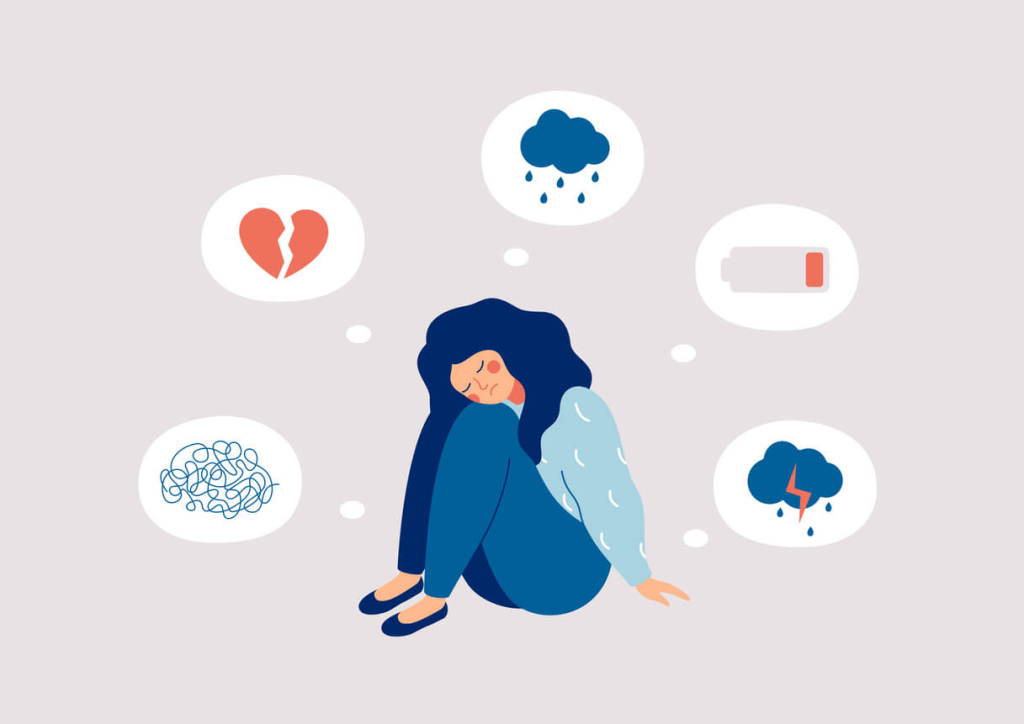The post is developed in partnership with BetterHelp.

We all feel a bit sad sometimes. Maybe we had a fight with our partner, received a poor performance review at work, or scored poorly on a test at school. Sadness is a normal human emotion, but it’s not meant to last forever. One of the most common symptoms of depression is sadness, but there are a plethora of other signs and symptoms that can come along with it. Here, we’ll go over 10 different warning signs that shouldn’t be ignored, as they could indicate you’re experiencing depression.
What Is Depression?
Depression is a serious mental health disorder that often needs professional intervention and treatment. Its two main symptoms are persistent sadness and loss of interest in previously enjoyed activities, but it tends to be accompanied by other signs as well. Depression can run on a spectrum, ranging from mild to moderate to severe symptoms. To learn more about moderate depression, try visiting the following link: www.betterhelp.com/advice/depression/signs-that-you-may-have-moderate-depression/. Remember that everyone experiences depression differently, making it crucial not to turn a blind eye when you’re not acting like yourself.
10 Signs Of Depression You Don’t Want To Ignore
Persistent sadness and loss of interest in previously enjoyed activities are two of the hallmark traits of depression, but some other signs and symptoms may also be noticeable, including the following:
- Trouble focusing: Depression affects how you think and feel, and oftentimes it can be difficult to focus on anything other than the sad thoughts and feelings you’re experiencing. This can affect your performance at school and work and impact how you engage with your loved ones.
- Sleeping too little or too much: If you’re suddenly oversleeping or waking up constantly throughout the night, it could indicate depression. Often, fatigue is to blame, as depression can deplete your energy levels and make it difficult to get out of bed in the morning.
- Unexplained crying spells: Crying is a natural way to release the emotions you’re feeling and can be healthy for the body and mind. However, if you’re crying for seemingly no reason or feeling tearful regularly, depression could be the cause.
- Feeling worthless: It’s common to feel worthless or inadequate when you’re living with depression. These thoughts and feelings may ruminate over and over in your mind, leading you to feel increasingly bad about yourself as time passes.
- Irritability: Irritability and depression are intrinsically linked, as people who are experiencing depression tend to have less patience and become frustrated more easily. You may take your anger out on loved ones such as family or friends, or even coworkers, often impulsively and over small matters.
- Withdrawing from loved ones: When you have depression, you may go from being a bubbly, sociable person to someone who just wants to stay home all day. You may not have the energy or desire to see your loved ones, becoming isolated from other people as a result.
- Having low energy: Given that depression often causes people to not get enough sleep, being fatigued and having low energy levels can be common. This can make it challenging to perform everyday tasks like showering or brushing your teeth, and nearly impossible to do extra tasks like grocery shopping or exercising.
- Overeating or eating too little: If you have depression, you might overeat in an attempt to feel better, or undereat from having no appetite. Turning to food for comfort is common, but it may only make you feel worse about yourself, and certain foods may exacerbate your symptoms.
- Having unexplained aches and pains: Mental illness affects more than just the mind; it can also have an impact on the body. Feeling tension in your shoulders, a pit in your stomach, or chronic pain throughout your being could point to depression.
- Thinking about suicide: Depression can have several detrimental outcomes on a person’s life, with suicide being the most serious. Thinking about death, making plans for suicide, or attempting it can be devastating byproducts of struggling with depression. It’s important to receive urgent support if you’re contemplating suicide, so don’t hesitate to reach out for help if you’re in this situation.
These symptoms can apply to many different mental health disorders. Therefore, it’s important to avoid jumping to conclusions and assuming you have depression if you’re experiencing one or more of them. Connecting with a mental health professional, such as a therapist, could be a helpful next step to take to determine whether you’re facing depression or something else.
Conclusion
Admitting you’re struggling can be difficult, but rest assured that reaching out for help isn’t a sign of weakness, but one of great strength. You don’t have to go through depression on your own, and support is always available. By reaching out to a friend, family member, therapist, or other trusted individual, you can help safeguard your mental health and begin your unique journey toward healing, hope, and happiness.